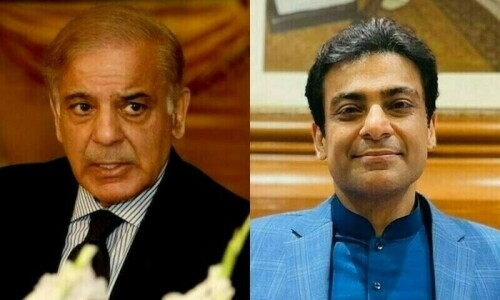THE recent petroleum crisis is illuminating in how this government functions — or doesn’t. A number of conflicting and generally unhelpful assessments have been provided by federal ministers, but with one underlying message: the increase in petroleum demand in early January was both unprecedented as well as unforeseen, and was the root cause of the shortage. A fact-finding committee appointed by the prime minister has quickly — and conveniently — found the main culprit: Ogra, the industry regulator.
Why did such a catastrophic shortage of an essential commodity, that is now abundantly and cheaply available globally, occur? It will be illustrative to examine the various factors at play.
The stock situation: Under the Rules of Business, the Economic Coordination Committee of the Cabinet meets every fortnight — now more frequently — under the chairmanship of the finance minister. Agenda items 1 and 2 are fixed. The first item takes stock of the implementation status of all outstanding decisions, while Agenda item 2 is the economic adviser’s presentation, which is required to review the latest economic indicators as well as inform the ECC of the latest stock position of all essential commodities in the country. Low stocks of essential commodities, especially petroleum products, wheat, sugar and fertiliser, are red-flagged and re-stocking efforts highlighted.
Thus, if ministers were paying attention, a depleting stock situation of petroleum should not have come as a surprise.
Why did such a catastrophic shortage of an essential commodity occur?
Surge in demand: Perhaps cheaper prices of petrol had caused a spike in demand, thus leading to a sharp, unplanned drawdown in inventory? This explanation too is wanting. International oil prices had begun to collapse from July onwards, while the government effected the first big cut in domestic prices on Nov 1, followed by another from Dec 1. In addition, the government itself had taken a decision (rightly) to shut down CNG stations in Punjab for two months in the winter. Competent planning would have put two and two together and catered for higher demand well in advance.
The role of PSO: Perhaps the fault lies with Pakistan State Oil, which has been less fleet-footed under this government’s appointed management than it should have been? After all, the petroleum minister did say something to the effect that “receivables of Rs220 billion for a Rs1 trillion company should not be a problem to manage”. One wonders if the minister ran his personal business — a hugely successful airline — with the same nonchalance.
PSO has been at the receiving end of the accumulation of the energy sector circular debt since 2008. With power sector receivables piling up to over Rs200bn, PSO had defaulted 26 times on its letter of credit payments since October 2014, and was desperately writing and informing the government of the situation. With its bank lines “pulled” it could not undertake further borrowing and, hence, import petroleum products.
Were the ministries of petroleum, water and power and finance paying attention?
The role of finance: This brings us to the role of the Ministry of Finance in the crisis — and the role of financial management. For the past several years, MOF has been a reluctant “financier of last resort” for the failing public-sector enterprises. The ministry is clearly in a difficult — and unenviable — position. Under the IMF programme, it is in a fiscal straitjacket. In addition, it has desperately been trying to impose a measure of financial discipline on state-owned enterprises such as PIA and Pakistan Steel Mills since 2008 at least.
However, being in the driver’s seat in implementing economic reform, it cannot do two mutually exclusive things at the same time: it cannot fail to implement reform, especially in the case of the power sector and the PSEs, while at the same time withhold money from the energy sector or PIA or Steel Mills and bring them to the verge of collapse.
This is especially true in the energy sector. PSO’s weekly requirement for import of fuel is around Rs9-10bn. With its bank lines choked, it has no other institution to turn to other than MOF. If the finance ministry injects money into the energy sector, or provides a sovereign guarantee to PSO for more borrowing, in drips and drabs after a period of several months, the supply chain will get affected — as it so dramatically did. (The same strategy of delayed release of funds to settle payment arrears to the IPPs, led to a “technical” sovereign default in 2013).
This issue also highlights poor financial management. Not just in failing to recognise the grave consequences of MOF’s delayed action, but also in not prioritising fiscal resources to their most urgent use — away from vote-grabbing “development” schemes and towards keeping the economy’s wheels well-supplied and well-oiled.
Finally, the whole episode has highlighted critical flaws in the PML-N government’s management style. Overly centralised decision-making, multiple and overlapping “power centres”, and a lack of coordination (at least on this issue) have been rightly highlighted by commentators. I would add a lack of prioritisation.
As the crisis was unfolding, the prime minister was on a “private” trip to Saudi Arabia. More crucially, the finance minister was in Japan wooing a yen loan, as well as new investors. At home, Pakistan’s second largest company (by sales) was in default, while one of the largest foreign investments in the country in the last few years, Tuwairqi Steel Mills Ltd., had issued a “shut down” notice because the ECC, which the finance minister heads, has been unable to take a decision for the past several months. Shouldn’t the chairman ECC have been more concerned with resolving these two important, unaddressed issues on his plate — which were already drawing adverse global attention for Pakistan?
Without a more robust effort at reforming the power sector, and more competent economic management in general, this latest crisis is unlikely to be the last.
The writer is a former economic adviser to government, and currently heads a macroeconomic consultancy based in Islamabad.
Published in Dawn, January 23rd, 2015
On a mobile phone? Get the Dawn Mobile App: Apple Store | Google Play













































